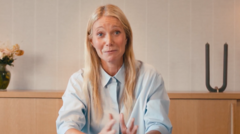Many women suffering from Polycystic Ovary Syndrome (PCOS) are being misled by unqualified influencers on social media who sell unproven tests and dietary supplements promising cures. This exploitation occurs amidst the lack of effective medical solutions and support for those managing the condition.
Social Media Influencers Selling False PCOS Cures Exploit Vulnerable Women

Social Media Influencers Selling False PCOS Cures Exploit Vulnerable Women
Unqualified influencers leverage social media to promote unproven remedies for Polycystic Ovary Syndrome, leaving many women feeling worse.
In recent years, an alarming trend has emerged on social media platforms, where influencers are marketing questionable remedies for Polycystic Ovary Syndrome (PCOS), a hormonal disorder affecting roughly one in ten women globally. With a lack of effective medical treatments available, many women are turning to unqualified influencers, who often portray themselves as health experts, to address their debilitating symptoms.
One case is that of Sophie, who lived with debilitating symptoms associated with PCOS for over a decade. She encountered Kourtney Simmang’s social media profile, which promised comprehensive solutions including lab tests, dietary routines, and coaching for $3,600 (£2,800). After participating for nearly a year without improvement, Sophie realized the program was of no help, leaving her with a worse relationship with her body.
Concerns surrounding these influencers have been voiced by professionals, such as Dr. Jen Gunter, a noted gynecologist, who pointed out that Kourtney lacks the necessary qualifications to administer the tests she promoted. Additionally, recent investigations revealed that half of the most prominent PCOS-related content on platforms like TikTok and Instagram perpetuates misinformation.
In an age when research shows that up to 70% of women with PCOS remain undiagnosed, influencers capitalize on this gap, touting unproven “cures” while dismissing clinically approved treatments, such as birth control and metformin. Disturbingly, these claims include assertions that the condition can be cured with dietary changes or supplements, despite the absence of clinical evidence supporting such statements.
Among the prominent figures in this space is Tallene Hacatoryan, a registered dietician with a social media following of over two million. She promotes dietary supplements and weight loss tools, emphasizing weight management as a solution to PCOS. However, women who followed her guidance, like Amy from Northern Ireland, reported negative experiences, with restrictive diets exacerbating their struggles rather than improving them.
Dr. Gunter cautioned that these misleading plans may lead to unhealthy relationships with food, potentially contributing to eating disorders. Concerned professionals are urging individuals struggling with PCOS to seek medical advice from specialized healthcare providers, rather than turning to online influencers.
Efforts are being made globally to change the narrative surrounding PCOS. Advocates like Medlyn, a medical student in Nigeria, emphasize the importance of medical guidance and support for women, encouraging them to embrace their condition rather than feel trapped by its stigma. Organizations like PCOS Challenge are dedicated to educating women about viable treatment options, ensuring they understand that with medical support, managing PCOS symptoms can lead to successful pregnancies similar to those without the disorder.
As we navigate this landscape of information, it’s crucial for those affected by PCOS to seek evidence-based assistance, enabling them to reclaim their health and challenge the societal stigma attached to the condition.


















